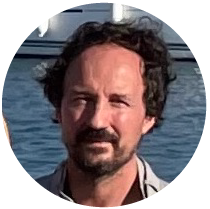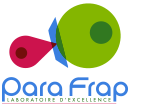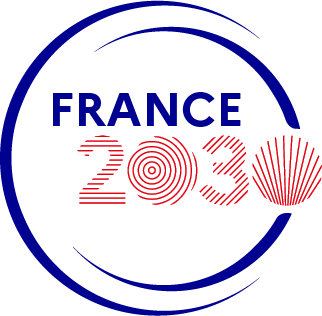-
PARAFRAP
- Qui sommes-nous
- Objectifs du Labex
- Laboratoires de recherches
- Coordinateurs
- Collaborateurs industriels
- Tutelles et soutiens
- GOUVERNANCE
- Organisation
- Comité de pilotage
- Comité exécutif
- Conseil scientifique international
- Comité Institutionnel
- FORMATION
- CONFERENCES
- THÉMATIQUES
- Exploitation des données post génomiques
- Mécanisme de la pathogénie
- Biologie Cellulaire et Moléculaire
- Nouvelles stratégies d'interventions thérapeutiques
- Plateformes
- VALORISATION
-
PARAFRAP
- Qui sommes-nous
- Objectifs du Labex
- Laboratoires de recherches
- Coordinateurs
- Collaborateurs industriels
- Tutelles et soutiens
- GOUVERNANCE
- Organisation
- Comité de pilotage
- Comité exécutif
- Conseil scientifique international
- Comité Institutionnel
- FORMATION

Yvon STERKERS
Information

MIVEGEC 
Biologie, Génétique et Pathologie des Pathogènes Eucaryotes 
Montpellier 
0000-0002-5623-5664 
Cette adresse e-mail est protégée contre les robots spammeurs. Vous devez activer le JavaScript pour la visualiser. 
https://mivegec.fr/ Scientific interests and projects
The team's interest relies in the molecular and cell biology of protozoan parasites, with a focus on Trypanosomatids (Leishmania and Trypanosoma brucei). More precisely, we seek to elucidate the mechanisms of basic biological processes of the parasite cell which are 'divergent' from classical eukaryotic models – and more specifically related to mitosis, e.g. DNA replication, chromosomal segregation, recombination, spindle assembly, cell division …
One of the great conceptual achievements of the group over the last 10 years has been the demonstration of a constitutive so-called 'mosaic aneuploidy' in Leishmania, which, even if exaggerated in in vitro conditions (as opposed to the 'real life' of the parasite), questions its astonishing ability to generate and tolerate aneuploidy. This may be related to a greater tolerance to mis-replication or to some degree of 'permissive' segregation – and this is still being elucidated.
More on the 'cell biology' side, the team takes interest into microtubular structures and microtubule-associated proteins, which are deeply involved in events such as cell growth and cell division. Present projects focus on the role of post-translational modifications of microtubules and that of kinesins in cell division.
For these studies, the group has developed novel molecular tools, in particular the first efficient CRISPR-Cas9 strategy in Leishmania and more recently, has set up an efficient and straightforward approach for inducible knock-outs, opening for the first time the way to the study of essential genes in this parasite. It also takes advantage of the mastering by the team of two demanding techniques, DNA molecular combing and FISH, as well as obviously, more 'classical' approaches such as microscopy and imaging, WGS, ChIP, etc.
Collaborations are open about (i) these matters/models with different view angles or technological approaches, or (ii) different models of which the study would benefit from technical approaches not necessarily mastered in the network.
Top 5 publications of the last 5 years
1. Morelle C*, Sterkers Y*°, Crobu L, MBang-Benet DE, Kuk N, Portalès P, Bastien P, Pagès M°, Lachaud L°. The nucleoporin Mlp2 is involved in chromosomal distribution during mitosis in trypanosomatids. Nucleic Acids Res. 2015 Apr 30;43(8):4013-27. *cofirst and °co-corresponding author. doi: 10.1093/nar/gkv056
2. Garcia-Silva MR, Sollelis L, MacPherson CR, Stanojcic S, Kuk N, Crobu L, Bringaud F, Bastien P, Pagès M, Scherf A, Sterkers Y. Identification of the centromeres of Leishmania major: revealing the hidden pieces. EMBO Rep. 2017 Nov;18(11):1968-1977. 10.15252/embr.201744216
3. Vergnes B, Gazanion E, Mariac C, Du Manoir M, Sollelis L, Lopez-Rubio JJ, Sterkers Y, Bañuls AL. A single amino acid substitution (H451Y) in Leishmania calcium-dependent kinase SCAMK confers high tolerance and resistance to antimony. J Antimicrob Chemother. 2019 Nov 1;74(11):3231-3239. doi: 10.1093/jac/dkz334
4. Sollelis L, Ghorbal M, MacPherson CR, Martins RM, Kuk N, Crobu L, Bastien P, Scherf A, Lopez-Rubio JJ, Sterkers Y. First efficient CRISPR-Cas9-mediated genome editing in Leishmania parasites. Cell Microbiol. 2015 Oct;17(10):1405-12. doi: 10.1111/cmi.12456
5. Stanojcic S, Sollelis L, Kuk N, Crobu L, Balard Y, Schwob E, Bastien P, Pagès M, Sterkers Y. Single-molecule analysis of DNA replication reveals novel features in the divergent eukaryotes Leishmania and Trypanosoma brucei versus mammalian cells. Sci Rep. 2016 Mar 15;6:23142. doi: 10.1038/srep23142
mardi 20 janvier 2026Call for Applications: New Junior Research Groups at Institut Pasteur
Call for Applications: New Junior Research Groups at Institut Pasteur The Institut Pasteur has launched an international call to recruit new junior group leaders.This is a unique opportunity for high-potential scientists to...
lundi 12 janvier 2026Ingénieur·e d’étude / Research Engineer – Mosquito Immunity (IBMC, Strasbourg)
JOB : Ingénieur·e d’étude / Research Engineer – Mosquito Immunity (IBMC, Strasbourg) 🇫🇷 Le laboratoire Mosquito Immune Responses recrute un·e ingénieur·e d’étude à l’IBMC (Strasbourg). La personne recrutée sera en...
mardi 6 janvier 2026Applications Open for the Biology of Parasitism Course 2026
Applications are now open for the 2026 Biology of Parasitism (BoP) course, taking place June 12–July 23, 2026 at the Marine Biological Laboratory in Woods Hole, MA.This intensive 6-week program offers PhD students and postdocs advanced training in...
jeudi 27 novembre 2025Research Assistant/Associate Position | Molecular Parasitology | Newcastle University
Newcastle University offers a full-time, fixed-term position (3 years) for a Research Assistant or Research Associate in Molecular Parasitology — funded by the Medical Research Council (MRC). About the Opportunity Location:...
jeudi 13 novembre 2025PhD Opportunity | African Trypanosomes | University of York
Multidisciplinary PhD opportunity in the fields of infectious diseases, gene regulations and molecular signalisation. Fully Funded 4-Year PhD at the University of York A fully funded PhD opportunity is available at the...
mardi 14 octobre 2025Recap of the EMBO Workshop 2025
The EMBO Workshop 2025 “Host–Parasite Relationship: From Mechanisms to Control Strategies”, took place from October 5–8, 2025, on the beautiful Île des Embiez (France). Organized within the framework of the LabEx ParaFrap and...
jeudi 31 juillet 2025PostDoc l Toxoplasma l Montpellier, FR
Postdoc (M/F) in molecular and biochemical parasitology (Toxoplasma gondii) A 24-month post-doctoral position starting on January 2026 and funded by the French National Research Agency (ANR) is available in the in the...
lundi 9 juin 2025PostDoc l Trypanosoma l Bordeaux, FR
Postdoc (M/F) Molecular and cell biology in Trypanosoma brucei A 24-month post-doctoral position starting on November 1st 2025 (or before) and funded by the French National Research Agency (ANR) is available in the...
mercredi 4 juin 2025PostDoc l Plasmodium l Montpellier, FR
Postdoc (M/F) in molecular biology in P. falciparum Workplace: MONTPELLIER Contract Period: 24 months Expected date of employment: 1 October 2025 Proportion of work: Full Time Remuneration: Starting from...
vendredi 25 avril 2025EMBO Workshop Host Parasite 2025 - Registration
Registration is now open for the EMBO Workshop "Host-Parasite Relationship: From Mechanisms to Control Strategies," supported by...
Bluesky feed
PROGRAMME DE FORMATION FR
Programme Doctoral InternationalProgramme Post-doctoralACTUALITÉS
© 2023. Tous droits réservés by MLCOM
Notre site LabEx ParaFrap utilise des cookies pour réaliser des statistiques de visites, partager des contenus sur les réseaux sociaux et améliorer votre expérience. En refusant les cookies, certains services seront amenés à ne pas fonctionner correctement. Nous conservons votre choix pendant 30 jours. Vous pouvez changer d'avis en cliquant sur le bouton 'Cookies' en bas à gauche de chaque page de notre site. En savoir plus
Paramétrages de cookies
×Cookies fonctionnels
Ce site utilise des cookies pour assurer son bon fonctionnement et ne peuvent pas être désactivés de nos systèmes. Nous ne les utilisons pas à des fins publicitaires. Si ces cookies sont bloqués, certaines parties du site ne pourront pas fonctionner.
Mesure d'audience
Ce site utilise des cookies de mesure et d’analyse d’audience, tels que Google Analytics et Google Ads, afin d’évaluer et d’améliorer notre site internet.
- Google Analytics
- Google Ads
Contenus interactifs
Ce site utilise des composants tiers, tels que NotAllowedScript69859b1890cafReCAPTCHA, Google NotAllowedScript69859b18907a8Maps, MailChimp ou Calameo, qui peuvent déposer des cookies sur votre machine. Si vous décider de bloquer un composant, le contenu ne s’affichera pas
- Google Maps
Pour en savoir plus, cliquez sur le lien.
Voir le site officiel - Calameo
Pour en savoir plus, cliquez sur le lien.
Voir le site officiel - reCaptcha V2
Pour en savoir plus, cliquez sur le lien.
Voir le site officiel - reCaptcha V3
Pour en savoir plus, cliquez sur le lien.
Voir le site officiel
Réseaux sociaux/Vidéos
Des plug-ins de réseaux sociaux et de vidéos, qui exploitent des cookies, sont présents sur ce site web. Ils permettent d’améliorer la convivialité et la promotion du site grâce à différentes interactions sociales.
- Twitter
Pour en savoir plus, cliquez sur le lien.
Voir le site officiel
Session
Veuillez vous connecter pour voir vos activités!Autres cookies
Ce site web utilise un certain nombre de cookies pour gérer, par exemple, les sessions utilisateurs.




